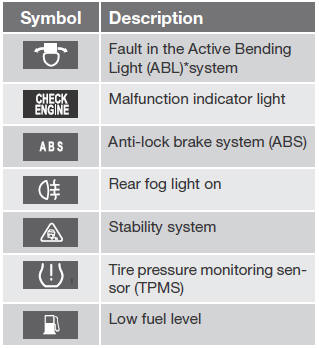Function check

All indicator and warning symbols light up in ignition mode II or when the engine is started. When the engine has started, all the symbols should go out except the parking brake symsymbol, which only goes out when the brake is disengaged.
If the engine does not start or if the function check is carried out in ignition mode II, all symbols go out after 5 seconds except the symbol for faults in the vehicle's emissions system and the symbol for low oil pressure.
Certain symbols may not have their functions illustrated, depending on the vehicle's equipment.
Indicator and information symbols


 Fault in the Active
Bending Light (ABL) system
Fault in the Active
Bending Light (ABL) system
This symbol will illuminate if the there is a fault in the ABL system. See page 97 for more information about this system.
 Malfunction Indicator
Light
Malfunction Indicator
Light
As you drive, a computer called On-Board Diagnostics II (OBDII) monitors your vehicle's engine, transmission, electrical and emission systems.
The malfunction indicator (CHECK ENGINE) light will illuminate if the computer senses a condition that potentially may need correcting. When this happens, please have your vehicle checked by a trained and qualified Volvo service technician as soon as possible.
A malfunction indicator (CHECK ENGINE) light may have many causes. Sometimes, you may not notice a change in your car's behavior. Even so, an uncorrected condition could hurt fuel economy, emission controls, and drivability. Extended driving without correcting the cause could even damage other components in your vehicle.
This light may illuminate if the fuel filler cap is not closed tightly or if the engine was running while the vehicle was refueled.
 Canadian models are
equipped with this symbol.
Canadian models are
equipped with this symbol.
 Anti-lock Brake System
(ABS) warning light
Anti-lock Brake System
(ABS) warning light
If the warning light comes on, there may be a malfunction in the ABS system (the standard braking system will still function). Check the system by:
1. Stopping in a safe place and switching off the ignition.
2. Restart the engine.
3. If the warning light goes off, no further action is required.
If the warning light remains on, the vehicle should be driven to a trained and qualified Volvo service technician for inspection, see page 121 for additional information.
 Canadian models are
equipped with this symbol.
Canadian models are
equipped with this symbol.
 Rear fog light
Rear fog light
This symbol indicates that the rear fog light (located in the driver's side tail light cluster) is on.
 Stability system
Stability system
This indicator symbol flashes when the DSTC (Dynamic Stability and Traction Control system) is actively working to stabilize the vehicle, see page 149 for more detailed information.
 Tire pressure monitoring
system (TPMS)*
Tire pressure monitoring
system (TPMS)*
This symbol illuminates to indicate that tire pressure in one or more tires is low, see page 293 for detailed information.
 Low fuel level
Low fuel level
When this light comes on, the vehicle should be refueled as soon as possible. See page 254 for information about fuel and refueling.
 Information symbol
Information symbol
The information symbol lights up and a text message is displayed to provide the driver with necessary information about one of the vehicle's systems. The message can be erased and the symbol can be turned off by pressing the READ button (see page 131 for information) or this will take place automatically after a short time (the length of time varies, depending on the function affected).
The information symbol may also illuminate together with other symbols.
 High beam indicator
High beam indicator
This symbol illuminates when the high beam headlights are on, or if the high beam flash function is used.
 Left turn signal indicator
Left turn signal indicator
 Right turn signal indicator
Right turn signal indicator
![]() NOTE
NOTE
- Both turn signal indicators will flash when the hazard warning flashers are used.
- If either of these indicators flash faster than normal, the direction indicators are not functioning properly.
 Sport mode
Sport mode
This symbol illuminates to indicate that the stability system's Sport mode has been activated to help provide maximum tractive force, for example when driving with snow chains, or driving in deep snow or loose sand.
See also:
Unleaded fuel
Each Volvo has a three-way catalytic converter and must use only unleaded gasoline.
U.S. and Canadian regulations require that pumps delivering unleaded gasoline be
labeled "UNLEADED". O ...
Condensation on the inside of thewindows
Keeping the insides of the windows clean will
help reduce the amount of condensation that
forms on the windows. Use a commercial window
cleaning agent to clean the windows. ...
Volvo S60 Owners Manual
h4 {color:#800000}
h3 {color:#0033CC}
h2 {color:#008000}
h1 {color:#FF0000}
...
